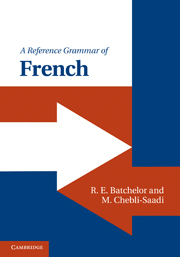Book contents
- Frontmatter
- Contents/Table des matières
- Preface/Préface
- Acknowledgments/Remerciements
- Brief introduction to the French language (with reference to the French of francophone countries)/Brève introduction à la langue française (avec référence au français des pays francophones)
- Part I
- Part II
- Part III
- 11 Verbs and moods of verbs/Les verbes et les modes des verbes
- 12 Infinitive, perfect infinitive/L'infinitif, l'infinitif passé
- 13 Present tense/Le présent
- 14 Perfect tense and agreement of the past participle/Le passé composé et l'accord du participe passé
- 15 Irregular past participles/Les participes passés irréguliers
- 16 Past participles used as nouns/Les participes passés considérés comme noms
- 17 Ablative absolute (absolute use of the past participle)/L'ablatif absolu (usage absolu du participe passé)
- 18 Verb + infinitive when verb + that + subordinate clause is used in English/Verbe + infinitif lorsqu'un verbe + that + proposition subordonnée s'emploie en anglais
- 19 Pluperfect tense/Le plus-que-parfait
- 20 Past anterior tense/Le passé antérieur
- 21 Imperfect tense/L'imparfait
- 22 Preterit tense/Le passé simple
- 23 Contrasts between the perfect tense, preterit tense and imperfect tense/Les contrastes entre le passé composé, le passé simple et l'imparfait
- 24 Future tense/Le futur
- 25 Future perfect tense/Le futur antérieur
- 26 Conditional tense/Le conditionnel
- 27 Conditional perfect tense/Le conditionnel passé
- 28 Progressive tense, present participle, gerund/Le temps progressif, le participe présent, le gérondif
- 29 Imperative mood/Le mode impératif
- 30 Irregular verbs/Les verbes irréguliers
- 31 Verbs of the –er type with orthographic changes/Les verbes en –er avec modifications orthographiques
- 32 Transitive and intransitive verbs/Les verbes transitifs et intransitifs
- 33 Reflexive verbs/Les verbes pronominaux
- 34 Passive voice/La voix passive
- 35 Defective verbs/Les verbes défectifs
- 36 Modal verbs/Les auxiliaires modaux
- 37 Ellipsis of verbs in main and subordinate clauses/L'ellipse du verbe dans la proposition principale et la proposition subordonnée
- 38 Idiomatic uses of aller, avoir, être, faire and prendre/Les expressions idiomatiques concernant aller, avoir, être, faire et prendre
- 39 Impersonal verbs/Les verbes impersonnels
- 40 Verbs of perception + infinitive or a subordinate clause/Les verbes de perception + infinitif ou une proposition subordonnée
- 41 Subordinate clauses of time/La proposition subordonnée de temps
- 42 Complex verbal expressions/Les expressions verbales complexes
- 43 Verbs of movement/Les verbes de mouvement
- Part IV
- Part V
- Part VI
- Part VII
- Part VIII
- Part IX
- Part X
- Part XI
21 - Imperfect tense/L'imparfait
from Part III
Published online by Cambridge University Press: 05 June 2012
- Frontmatter
- Contents/Table des matières
- Preface/Préface
- Acknowledgments/Remerciements
- Brief introduction to the French language (with reference to the French of francophone countries)/Brève introduction à la langue française (avec référence au français des pays francophones)
- Part I
- Part II
- Part III
- 11 Verbs and moods of verbs/Les verbes et les modes des verbes
- 12 Infinitive, perfect infinitive/L'infinitif, l'infinitif passé
- 13 Present tense/Le présent
- 14 Perfect tense and agreement of the past participle/Le passé composé et l'accord du participe passé
- 15 Irregular past participles/Les participes passés irréguliers
- 16 Past participles used as nouns/Les participes passés considérés comme noms
- 17 Ablative absolute (absolute use of the past participle)/L'ablatif absolu (usage absolu du participe passé)
- 18 Verb + infinitive when verb + that + subordinate clause is used in English/Verbe + infinitif lorsqu'un verbe + that + proposition subordonnée s'emploie en anglais
- 19 Pluperfect tense/Le plus-que-parfait
- 20 Past anterior tense/Le passé antérieur
- 21 Imperfect tense/L'imparfait
- 22 Preterit tense/Le passé simple
- 23 Contrasts between the perfect tense, preterit tense and imperfect tense/Les contrastes entre le passé composé, le passé simple et l'imparfait
- 24 Future tense/Le futur
- 25 Future perfect tense/Le futur antérieur
- 26 Conditional tense/Le conditionnel
- 27 Conditional perfect tense/Le conditionnel passé
- 28 Progressive tense, present participle, gerund/Le temps progressif, le participe présent, le gérondif
- 29 Imperative mood/Le mode impératif
- 30 Irregular verbs/Les verbes irréguliers
- 31 Verbs of the –er type with orthographic changes/Les verbes en –er avec modifications orthographiques
- 32 Transitive and intransitive verbs/Les verbes transitifs et intransitifs
- 33 Reflexive verbs/Les verbes pronominaux
- 34 Passive voice/La voix passive
- 35 Defective verbs/Les verbes défectifs
- 36 Modal verbs/Les auxiliaires modaux
- 37 Ellipsis of verbs in main and subordinate clauses/L'ellipse du verbe dans la proposition principale et la proposition subordonnée
- 38 Idiomatic uses of aller, avoir, être, faire and prendre/Les expressions idiomatiques concernant aller, avoir, être, faire et prendre
- 39 Impersonal verbs/Les verbes impersonnels
- 40 Verbs of perception + infinitive or a subordinate clause/Les verbes de perception + infinitif ou une proposition subordonnée
- 41 Subordinate clauses of time/La proposition subordonnée de temps
- 42 Complex verbal expressions/Les expressions verbales complexes
- 43 Verbs of movement/Les verbes de mouvement
- Part IV
- Part V
- Part VI
- Part VII
- Part VIII
- Part IX
- Part X
- Part XI
Summary
The passage below describes the traditional grape harvest in southern France that would take place during the childhood of one of the authors who would share in this activity. It is a question of fond, affectionate memories of long ago. An annual and therefore cyclical event, the grape harvest is evoked with a series of verbs in the imperfect tense which emphasizes the repetitive nature of grape harvesting. The imperfect tense is highlighted and some translations are provided.
Needless to add, wine-making is central to the way of life of many French rural communities. It explains the fortune amassed by Balzac’s Père Grandet in Eugénie Grandet. He was a master cooper (maître tonnelier), and made his fortune from the production of barrels.
- Type
- Chapter
- Information
- A Reference Grammar of French , pp. 239 - 245Publisher: Cambridge University PressPrint publication year: 2011

